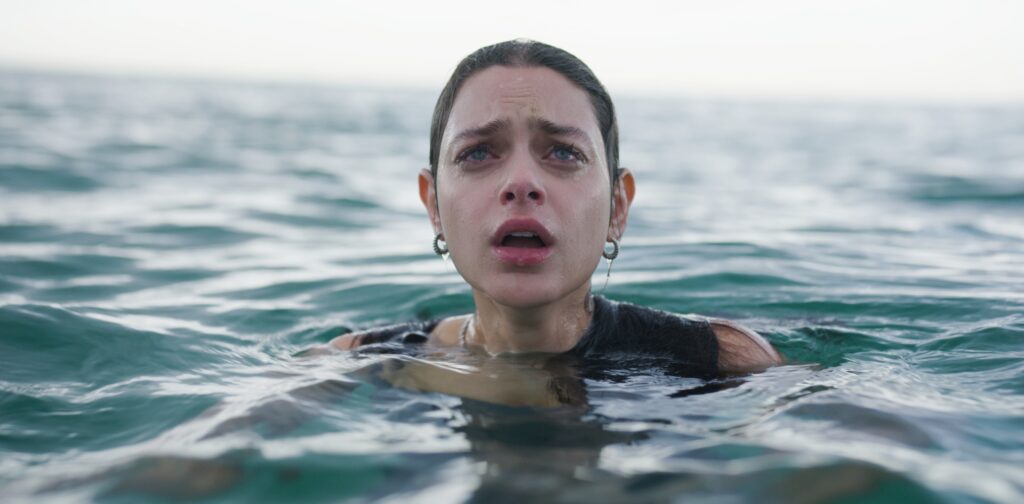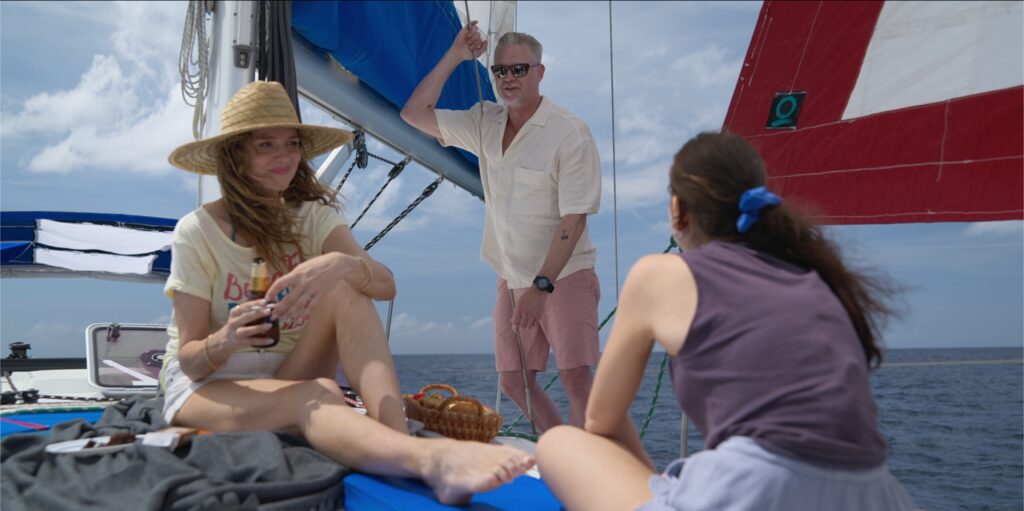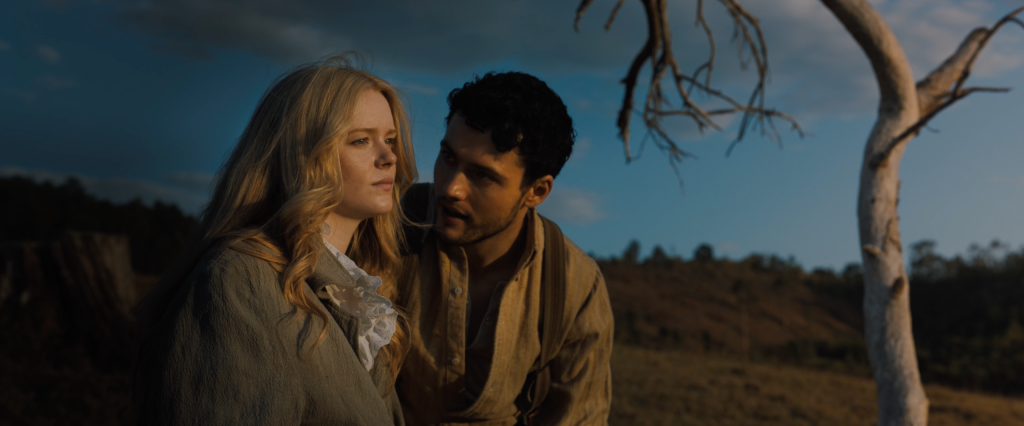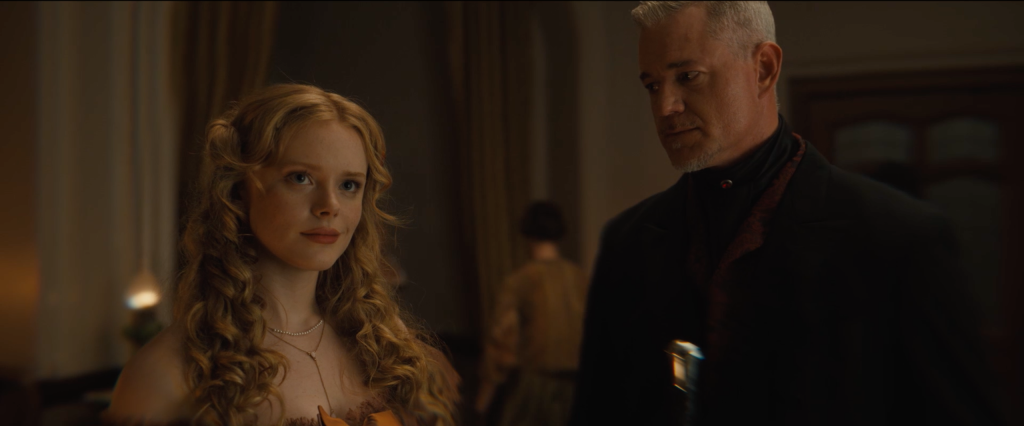November 3, 2023
by Carla Hay

Directed by John Barr
Culture Representation: Taking place in the Atlantic Ocean near the Dominican Republic, the action film “Dangerous Waters” features a predominantly white cast (with a few Latin people) representing the working-class, middle-class and criminal underground.
Culture Clash: A 19-year-old woman goes on a boating trip with her widowed mother and the mother’s new boyfriend, but things go horribly wrong after a violent invasion on the boat, and the daughter finds out some terrible secrets.
Culture Audience: “Dangerous Waters” will appeal mainly to people who don’t mind watching tawdry “women in peril” movies that have a lot of unrealistic scenes.

With horrendous film editing, “Dangerous Waters” (which is about a boat vacation that goes very wrong) has too many plot holes that are bigger than the ocean where much of this misguided story takes place. Characters are shown in deadly danger in one scene, and then in the next scene, they’re no longer in danger, with no explanation for how they got out of the predicament. The movie’s protagonist also has a showdown at the end of the film that looks like a rushed and badly conceived part of the story.
Directed by John Barr and written by Mark Jackson, “Dangerous Waters” has too many unbelievable scenarios to be taken seriously, but the movie desperately wants to be taken seriously. There’s no hint of irony, satire or comedy in the film. It’s just an erratically paced movie that alternates between dull “stranded in the ocean” scenes and fake-looking action scenes.
In “Dangerous Waters,” a woman has to fight off a lot of villains in order to escape from this hellish situation. The movie’s protagonist is 19-year-old Rose (played by Odeya Rush), who lives with her widowed mother Alma (played by Saffron Burrows), who works as a server at a local restaurant. Very little is told about Rose in this movie, except that she’s taking a gap year before going to college. Rose’s father, who was a decorated soldier in the U.S. military, passed away when she was very young. He died in combat when he was “blown up in Iraq,” according to what Rose says in the movie.
The movie doesn’t say where Rose and Alma live in the United States, but it’s close enough to the Caribbean, where Rose and Alma intend to sail on a fateful boating trip that is scheduled to be a 10-day vacation for them. (The movie was filmed on location, in and near the Dominican Republic.) Alma and Rose are going on this trip with Alma’s new boyfriend Derek Stipes (played by Eric Danes), a former police officer who is now a private security consultant. Alma and Derek have been dating each other for about a month. Derek owns the small sailboat that they will be taking for this trip.
Rose is wary about this trip because Alma doesn’t know Derek very well, but Alma convinces Rose to go on this vacation with her and Derek. There isn’t much to do on this boat but lounge around. Derek and Alma act as if they’re on a romantic couple’s trip, which makes Rose feel out of place. Expect to see Rose pouting a lot and having a hard time trusting Derek, who might as well be wearing a T-shirt that says, “I’ve Got Some Dirty Secrets.”
All of this sounds like the plot of a Lifetime movie. However, the main differences between “Dangerous Waters” and a Lifetime movie is that “Dangerous Waters” has graphic violence and explicit adult language, and the quality of filmmaking is much worse than a Lifetime movie. The atrocious film editing in “Dangerous Waters” jumps from scene to scene, often with no real continuity and with unexplained gaps in the story.
The first third of “Dangerous Waters” is a somewhat boring depiction of Rose, Alma and Derek having awkward conversations on the boat. At one point, Derek sharply swerves the boat, causing Alma (who is on deck) to fall into the water. Alma falls while holding Rose’s cell phone, which drops in the ocean. Derek rescues Alma, which makes Rose a little more trusting of Derek. But viewers are supposed to wonder: “Was Derek’s sharp swerve really an accident, or was it deliberate?”
While Derek was rescuing Alma, Rose went below deck to look for a blanket that Alma could use after emerging from the cold water. Rose sees in a trunk that Derek has an AR-15 rifle. As soon as she finds this gun, you just know this gun is going to be used.
And sure enough, Rose asks Derek if she can shoot the gun. He says yes, with Alma’s reluctant permission. It turns out that Rose is very skilled at shooting guns. Alma says that Rose has somehow inherited the gun-shooting skills that Rose’s father had. Rose is going to need those gun skills.
The middle of the movie is about a boat invasion and Rose being stranded in the ocean. The trip becomes a catastrophe when two men on a speedboat show up at night and suddenly invade Derek’s boat. It’s a violent robbery where Alma and Derek are attacked while Rose stays hidden out of sight from the attackers, who don’t know that she on the boat. The boat invaders are looking for something that Derek has, but Derek denies that he has it.
These invaders obviously know Derek and don’t believe him. When the invaders find what they’re looking for, they punish Derek by throwing him overboard. Alma is shot by the invaders, and she doesn’t survive. After the attackers leave, Rose finds Derek still alive in the ocean, when a barely conscious Derek floats near the boat. This isn’t spoiler information, since the trailer for “Dangerous Waters” gives away about 85% of the plot.
Before the invaders leave, they set fire to the boat, not knowing that someone (Rose) on the boat is alive and hiding inside. Rose uses a fire extinguisher to try to put out the flames, which are everywhere. (This part of the movie is also in the “Dangerous Waters” trailer.) You don’t have to be a firefighter to know that one fire extinguisher isn’t going to be enough to put out this raging blaze.
However, the movie abruptly cuts to the next day to show that the fire has vanished. One of the most idiotic things about “Dangerous Waters” is how the movie never bothers to explain how the fire got extinguished. Rose is stuck on a boat that doesn’t look as burned as it should be, considering how large this fire was. Rose can’t call for help because the boat’s communication equipment is burned and inoperable.
Rose also doesn’t show any signs that her health was negatively affected by smoke inhalation. Other moronic scenarios in the movie: There’s more than one occasion where Derek is presumed dead but then he shows up alive. “Dangerous Waters” gets more ridiculous, as it tries to make Rose some type of combat warrior heroine.
“Dangerous Waters” is the final movie that actor Ray Liotta filmed. At the age of 67, he died in his sleep from several health issues in 2022, while he was making this embarrassing flop movie. Liotta doesn’t appear until the last third of “Dangerous Waters,” where he has the role of the movie’s chief villain: a sex trafficker named The Captain. The acting performances in “Dangerous Waters” are mediocre but made worse by the awful screenplay. There are no real surprises in “Dangerous Waters,” which just turns into a mindless mishmash of fight scenes which look as phony as the movie’s failed attempt to look like a feminist movie.
Brainstorm Media released “Dangerous Waters” in U.S. cinemas, on digital and VOD on October 13, 2023.


